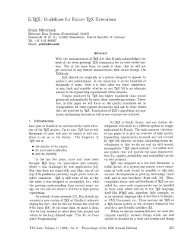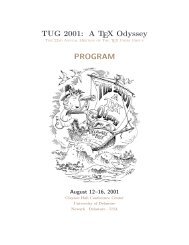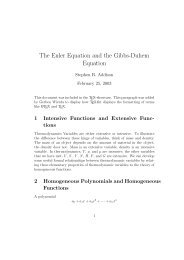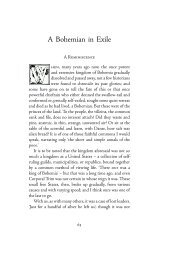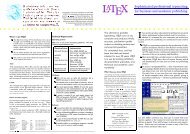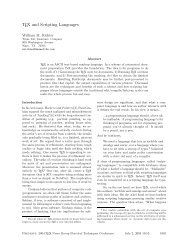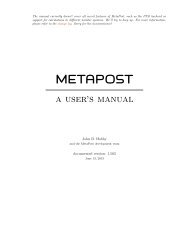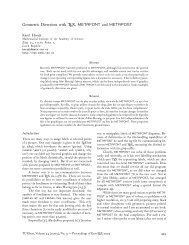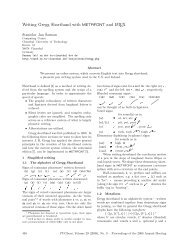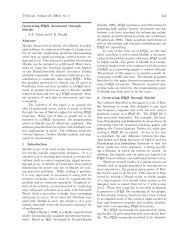Complete issue 10:1 as one pdf - TUG
Complete issue 10:1 as one pdf - TUG
Complete issue 10:1 as one pdf - TUG
You also want an ePaper? Increase the reach of your titles
YUMPU automatically turns print PDFs into web optimized ePapers that Google loves.
<strong>TUG</strong>boat, Volume <strong>10</strong> (1989): No. 1 21<br />
roveslots-end;<br />
slot-rover + t;<br />
end<br />
This code is used in section 13.<br />
16. Not recently used. We realize Knuth's<br />
suggestion to switch off used-bits for those pages<br />
only that are touched during the search process.<br />
Pages whose bits stay on then may be termed<br />
"recently recently used."<br />
-<br />
define recently-used(#) =- (#T.stamp # 0)<br />
define un-use-it (#) = #T.stamp + 0<br />
( Use the NRU 16 )<br />
begin slot-rover + secutor(s1ot-rover);<br />
while recently-used(s1ot-rover) do<br />
begin un-use-it (slot-rover);<br />
slot-rover +- secutor(s1ot-rover);<br />
end;<br />
end<br />
This code is used in section 13.<br />
17. At this place, external memory should be<br />
closed, deleted, freed or whatever. We output<br />
statistics.<br />
(Include system and memory management<br />
here 11 ) +G<br />
procedure close-mem;<br />
begin close-ext-mem;<br />
stat wlog-cr;<br />
wlog-ln ('took,', swap-no : 1, 'uswappingsuf or, ',<br />
clock : 1, ~uaccessesuon'); wlog(~uuuuu~,<br />
page-count : 1, -umemoryupagesuandu-,<br />
slot-count : 1, -,slots. ');<br />
tats<br />
end:<br />
18. Reorganizing the free lists. When we<br />
consider the various nodes strung out sequentially <strong>as</strong><br />
allocated from the free lists then W's access is kind<br />
of local most of the time. It is clear: One paragraph<br />
of text is under consideration in <strong>one</strong> period of<br />
time, <strong>one</strong> formula, <strong>one</strong> batch of finished lines. In<br />
a paging environment (and most of the machines<br />
are today), such locality is an advantage: Consider<br />
the "Working Set", the collection of memory pages<br />
accessed during a certain period of time. With good<br />
locality, the Working Set needs be small only, and<br />
page faults few.<br />
For and other programs with similar<br />
memory management, the free list tends to be<br />
scrambled and scattered during the first few pages<br />
already so that any locality will be non-existent at<br />
all. Thus the Working Set may grow about a third<br />
again <strong>as</strong> large. The solution is to reorganize the free<br />
list(s) at certain times such <strong>as</strong> to reflect physical<br />
neighbourhood again.<br />
This amounts to a Sort. A full sort, however,<br />
is out of question, it may take up to 16 sweeps<br />
through the list. It is not necessary even, since<br />
there is no harm in a scramble inside a memory<br />
page. So we do <strong>one</strong> sweep with <strong>as</strong> many buckets<br />
<strong>as</strong> there are memory pages, then recombine. What<br />
follows, then, is straightforward. (Really? I did<br />
cr<strong>as</strong>h. Where, Dear Reader, I won't tell you. You<br />
find out <strong>as</strong> an exercise.)<br />
-<br />
The proper place for this to be inserted is right<br />
after the grand free-node-list at the end of ship-out.<br />
define mem-page (#) mdzv (#)<br />
(Include system and memory management<br />
here 11 ) +=<br />
procedure reorganize-free-lists;<br />
var p, q, r, s, t: pointer; thzs-tail: pointer;<br />
i, a-p: p-mem-index;<br />
{ indices of memory pages )<br />
v-p-mzn. v-p-rnax, s-p-min, s-p-max:<br />
p-mem-index; { the single and variable<br />
free list maximum page indices found so<br />
far )<br />
begin debug check-mem(fa1se);<br />
{we suppose memory to be OK at this<br />
point, I simply want the w<strong>as</strong>-free bits set for<br />
checking later )<br />
gubed (Initialize free list reorganization 22);<br />
(Distribute variable size free list to the separate<br />
slots 23);<br />
(Recombine variable size free list 24);<br />
(Distribute single word free list 25);<br />
(Recombine single word free list 26);<br />
debug check-mem (true);<br />
{ Any non-trivial output here would mean<br />
trouble, but, <strong>as</strong> it turned out, the program<br />
cr<strong>as</strong>hed before reaching this point )<br />
gubed<br />
end;<br />
-<br />
19. define mem-page-avail G m-p-avail<br />
{ avoiding identifier conflict )<br />
define mem-page-tail m-p-tail<br />
20. (Locals for virtual memory handling 6) +Z<br />
mem-page-avail, mem-page-tail: array<br />
[p-mem-index] of pointer;<br />
21. (Get virtual memory started 8) +-<br />
for i +- p-mem-min to p-mem-max do<br />
begin { prepare the mem page buckets )<br />
mem-page-avail [i] +- null ;<br />
mem-page-tail [i] + null;<br />
end;



